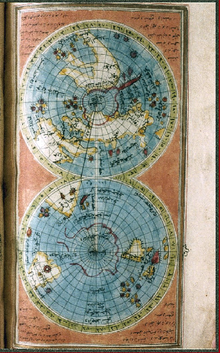İbrahim Hakkı Erzurumi
İbrahim Hakkı Erzurumi also Ibrahim Hakki Erzurumlu , (born 18th May 1703 in Hasankale in Erzurum , d. 22. June 1780 in Siirt ) was a Turkish polymath, mystic poet and follower of Sufism , whose main work Ma'rifatname far beyond the Ottoman Empire attention had found.
Live and act
His father was the dervish Osman Efendi. His mother came from a respected family and was called Hanîfe Hanım . In 1707 his father moved to Erzurum due to mental and material problems and got to know various Sufis . Later the father went on the pilgrimage and came to Tillo on the way to Mecca , where he met the Sheikh İsmâil Fakîrullah and joined him. When İbrahim Hakkı was nine years old, Osman Efendi had his son brought to Tillo by his brother so that he could also be taught by İsmâil Fakîrullah. In 1720, when İbrahim Hakkı was seventeen years old, Osman Efendi died and he returned to Erzurum, where he continued his education by learning the Persian and Arabic languages. In 1728 he returned to Tillo and expanded his knowledge of the mysticism of Sufism . He lived in the dervish cell that İsmâil Fakîrullah had built for his father and served his spiritual guide. After the death of İsmâil Fakîrullah in 1734 İbrahim Hakkı returned to Erzurum and worked as an imam in the Yukari Habib Efendi Mosque and married for the first time. In 1750 he performed the Hajj.
His increasing national fame and reputation moved Sultan Mahmud I to give Hakkı Erzurumi a job as a librarian in his palace library in Istanbul in 1747 . He is also very interested in the occidental literature in the library , with particular interest in the theory of the geocentric worldview and the emergence of the cosmos according to the connotation of religious ideology, which occupied a large part in his main work Marifetname , which between Was made in Erzurum again in 1755 and 1757; a work to be called encyclopedic in the oriental world at that time . However, Hakkı Erzurumi also dealt in one chapter with the theory of the heliocentric worldview , which had long been generally recognized in the West through the evidence of Isaac Newton , but Hakkı Erzurumi was probably more interested in the reconciliation of Islam with science. In addition to his knowledge, which Hakkı Erzurumi had acquired at the Sultan's library in Istanbul, Avicenna's academic legacy was also a treasure trove for the numerous writings and manuscripts he left for posterity. This includes fifteen books in Turkish, Persian and Arabic as well as countless manuscripts on topics such as medicine , anatomy , physiology , arithmetic , geometry , trigonometry , philosophy and ethics .
proof
- ↑ Erzurumlu İbrahim Hakkı. Biyografya beta, accessed on February 29, 2020 .
- ↑ Annemarie Schimmel : www.eslam.de/manuskripte/gedichte/diverse/ibrahim_hakki_erzurumlu_was_gott_tut.htm
- ↑ Sevtak Kadioglu: Erzurumi, İbrahim Hakkı , Lexicon of Eminent Natural Scientists, 2007, Volume 2; Elsevier GmbH, Munich; P. 147; ISBN 3-8274-1883-6
| personal data | |
|---|---|
| SURNAME | İbrahim Hakkı Erzurumi |
| BRIEF DESCRIPTION | Ottoman polymath |
| DATE OF BIRTH | May 18, 1703 |
| PLACE OF BIRTH | Hasankale near Erzurum |
| DATE OF DEATH | June 22, 1780 |
| Place of death | Siirt |

